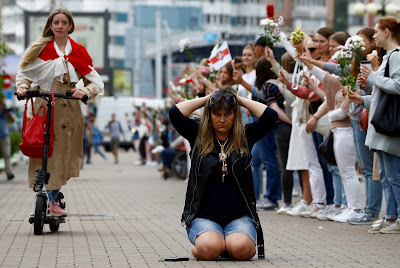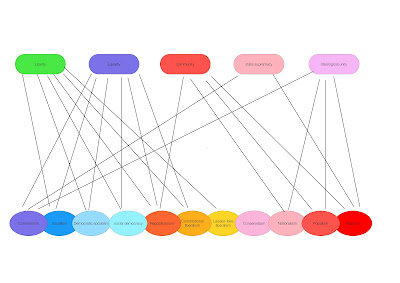Vasily Grossman's novel Life and Fate was long delayed in its publication because of Soviet censorship but has come to be recognized as one of the greatest novels of the twentieth century. Grossman was a complex and appealing intellectual. Born in 1905, he was raised in a secular Jewish family in Berdichev, Ukraine. He was educated as a chemical engineer, but his vocation was writing and literature. When Hitler's armies invaded the Soviet Union in 1941 Grossman became a war correspondent in the Red Army, and quickly emerged as one of the most active and popular observers of the chaos and murder of the German invasion throughout the war. He was present through much of the battle of Stalingrad, he was the first journalist to observe and write about the Treblinka death camp, and he maintained extensive notebooks recording his experiences and observations throughout the war and genocide. Alexandra Popoff's biography Vasily Grossman and the Soviet Century offers a masterful account of his life and writings. Grossman began Life and Fate in the 1950s and completed it for publication in 1960. However, the manuscript and supporting materials were confiscated ("arrested") by the KGB and the novel was not published until 1980 (in Switzerland) -- sixteen years after Grossman's death.
The novel is riveting and complex. It represents an important piece of literary creation, a contribution to the history of the Holocaust and the German-Soviet war, and a prolonged critique of Stalinism. What is of special interest on this day in February, 2022 -- today, the first day of Russia's inexcusable and criminal aggressive war against Grossman's homeland, the Ukraine -- is Grossman's willingness to occasionally put the narrative aside and engage in philosophical-historical reflection. One such moment is in part 2, chapter 15, where Grossman presents a series of striking ideas about the nature of good and evil in history.
The theory is presented in a convoluted way. The old Bolshevik Mikhail Mostovskoy is a prisoner in a German concentration camp, and is brought for interrogation or conversation with Liss, a high Gestapo officer and student of Hegel. Liss has an unusual and surprising thesis to discuss with Mostovskoy: that both the Nazi officer and the loyal Bolshevik are involved in the same business -- service to an insane leader and a totalitarian ideology. Liss argues that the ideologies are remarkably similar. And secretly, Mostovskoy has come to see that the Soviet system is not so different from the Nazi system. He muses:
With all the strength of his soul, with all his revolutionary passion, he would have to hate the camps, the Lubyanka, bloodstained Yezhov, Yagoda, Beria! More than that ...! He would have to hate Stalin and his dictatorship! More than that! He would have to condemn Lenin ...! That was the edge of the abyss. (399)
The discussion of good and evil in this chapter is conveyed through the semi-coherent writings of another prisoner, the holy fool Ikonnikov. It is Ikonnikov whose shabby document on scraps of paper reflects on the history of good and evil. But the main lines of the view are Grossman's.
So what is the substance of this conception? To begin, the Ikonnikov manuscript rejects the idea that good and evil can be defined in general religious or philosophical terms. Religious doctrines in particular have given rise to great suffering, and Ikonnikov denies that religious figures or texts give humanity a true understanding of good and evil. He also denies that "good" is a universal concept, as perhaps a philosopher might hold:
People struggling for their particular good always attempt to dress it up as a universal good. They say: my good coincides with the universal good; my good is essential not only to me but to everyone; in achieving my good, I serve the universal good. (405)
Many books have been written about the nature of good and evil and the struggle between them ... There is a deep and undeniable sadness in all this: whenever we see the dawn of an eternal good that will never be overcome by evil -- an evil that is itself eternal but will never succeed in overcoming good -- whenever we see this dawn, the blood of old people and children is always shed. Not only men, but even God himself is powerless to lessen this evil. (406)
And most pertinent, Ikonnikov (and Grossman) link this critique of "universal theory of the good" to the evils of Soviet actions in the 1930s in Ukraine:
I have seen the unshakeable strength of the idea of social good that was born in my own country. I saw this struggle during the period of general collectivization and again in 1937. I saw people being annihilated in the name of an idea of good as fine and humane as the ideal of Christianity. I saw whole villages dying of hunger; I saw peasant children dying in the snows of Siberia; I saw trains bound for Siberia with hundreds and thousands of men and women from Moscow, Leningrad and every city in Russia -- men and women who had been declared enemies of a great and bright idea of social good. This idea was something fine and noble -- yet it killed some without mercy, crippled the lives of others, and separated wives from husbands and children from fathers. (406-407)
Here Ikonnikov refers to the Holodomor, the terror and purges, and the Gulag -- all created by the deliberate purposes of the Soviet state. It is the utopian ideas of Marxist communism, and the grim realities of the Holodomor, the Stalinist terror, and the Gulag that Grossman is bringing into focus through Ikonnikov. Utopian socialism led to the Holodomor, the NKVD, and the Gulag -- all in pursuit of "socialism in one country." (No wonder the book was "arrested" in 1962; it is surprising that Grossman himself was not shot on the grounds of this passage alone.)
Here, the critique -- whether of religion or of Communism or of Nazism -- is a thorough rejection of the notion of sacrificing human beings to an idea or a future utopia.
Where do we find "good", then, if not in universal principles of religion or philosophy or utopian doctrine? Ikonnikov is very clear about this question: good is found in the concrete actions of ordinary human beings. Ikonnikov's and Grossman's conception of the good is particular to human beings as they exist in specific times and places; it is not adherence to a set of principles, visions of the future, or prescriptions for the ultimate "good" of society. Good is found in concrete humanity in its particular historical circumstances.
Yes, as well as this terrible Good with a capital 'G', there is everyday human kindness. The kindness of an old woman carrying a piece of bread to a prisoner, the kindness of a soldier allowing a wounded enemy to drink from his water-flask, the kindness of youth towards age, the kindness of a peasant hiding an old Jew in his loft. The kindness of a prison guard who risks his own liberty to pass on letters written by a prisoner not to his ideological comrades, but to his wife and mother. (407-408)
And what is "kindness", the constant refrain of Grossman's optimism about the future? It is the simple human fact of compassion, the fact that human beings are often able to recognize the reality and the humanity of others around them, and to see that human reality as a concrete impulse to action. It is --
The private kindness of one individual towards another; a petty, thoughtless kindness; an unwitnessed kindness. Something we could call senseless kindness. A kindness outside any system of social or religious good. (408)
This kindness, this stupid kindness, is what is most truly human in a human being. It is what sets man apart, the highest achievement of his soul. No, it says, life is not evil! This kindness is both senseless and wordless. It is instinctive, blind. (409)
But Mostovskoy the disillusioned Bolshevik is not persuaded by Ikonnikov:
Yes, the man who had written this was unhinged. The ruin of a feeble spirit! The preacher declares that the heavens are empty ... He sees life as a war of everything against everything. And then at the end he starts tinkling the same old bells, praising the kindness of old women and hoping to extinguish a world-wide conflagration with an enema syringe. What trash! (410)
So whose view of good and evil is this -- the holy fool or Grossman himself? I believe it is Grossman's view, or at least an important part of his view. The theme of kindness is very deep in Grossman, and it is fundamental to his humanism and his faith in the future. Take this vignette from "The Old Teacher":
Then six-year-old Katya, the daughter of Weissman, the lieutenant who had been killed, came up to him in her torn dress, shuffling along in galoshes that were falling off her dirty, scratched little feet. Offering him a cold, sour pancake, she said, “Eat, teacher!”
He took the pancake and began to eat it, looking at the little girl’s thin face. As he ate, there was a sudden hush in the yard. Everyone—the old women, the big-breasted young women who could no longer remember their husbands, the one-legged lieutenant Voronenko lying on a mattress under a tree—was looking at the old man and the little girl. Rosenthal dropped his book and did not try to pick it up—he was looking at the little girl’s huge eyes, which were intently, even greedily, watching him as he ate. Once again he felt the urge to understand a wonder that never ceased to amaze him: human kindness. Perhaps the answer was there in the child’s eyes. But her eyes must have been too dark, or maybe what got in the way were his own tears—once again he saw nothing and understood nothing. (The Road: Stories, Journalism, and Essays)
And later, when the Jews of the village are being forced to the ravine to be slaughtered, the old teacher and the girl Katya are united again:
“How can I comfort her? How can I deceive her?” the old man wondered, gripped by a feeling of infinite sorrow. At this last minute too, there would be no one to support him, no one to say what he had longed all his life to hear— the words he had desired more than all the wisdom of books about the great thoughts and labors of man.
The little girl turned toward him. Her face was calm; it was the pale face of an adult, a face full of tolerant compassion. And in a sudden silence he heard her voice.
“Teacher,” she said, “don’t look that way, it will frighten you.” And, like a mother, she covered his eyes with the palms of her hands. (The Road)









